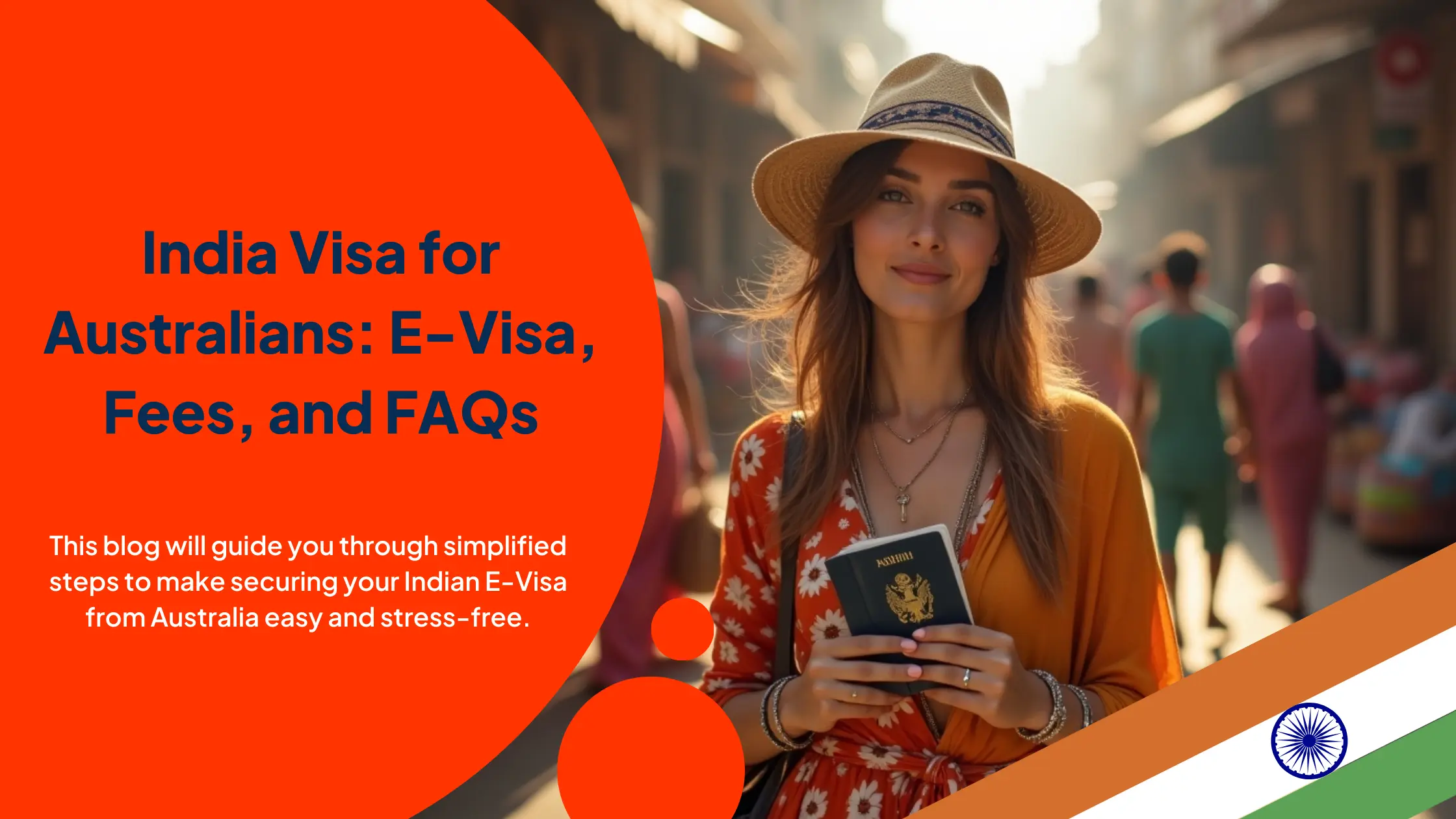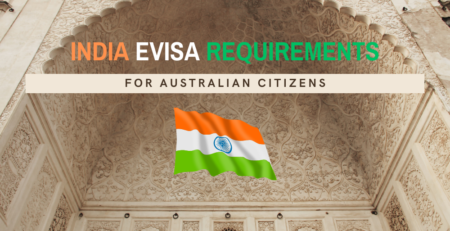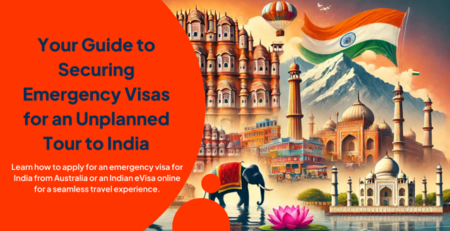Australia to India Visa: Eligibility, Documents, and Processing Time
India is one of the most visited countries globally, offering a rich blend of culture, history, and natural beauty. For Australian citizens planning a visit, understanding India’s visa policy is essential to ensure smooth travel plans. Whether you’re traveling for business, tourism, or other purposes, the visa requirements can vary based on the reason for your visit. In this article, we provide a detailed breakdown of India’s visa policy for Australian citizens, covering the available visa types, the application process, and other critical details to help make your travel experience hassle-free.
1. Types of Indian Visas Available to Australian Citizens
Tourist Visa (T-Visa)
For Australian tourists visiting India, the most common type of visa is the Tourist Visa. It is typically granted for a duration of 6 months, but it is important to note that the visa cannot be extended while you are in India. A multiple-entry tourist visa is also available, depending on your travel requirements.
eVisa for Australia Citizens
Indian eVisa are an excellent option for Australians who want to visit India for tourism, business, or medical purposes. The eVisa allows you to apply online and receive the visa via email. It saves time and the hassle of going to an embassy. The eVisa for Australian citizens can be granted for 30, 60, or 90 days depending on the category chosen.
Business Visa
The Business Visa is specifically designed for Australian citizens visiting India for business-related activities. The duration of the visa can range from 6 months to 1 year, and it allows multiple entries. Business visas are issued to those engaging in meetings, conferences, or establishing business contacts.
Medical Visa
If an Australian citizen is traveling to India for medical treatment, the Medical Visa is the best choice. This type of visa is issued for a period of 6 months, and it is designed for those who seek treatment in reputed medical facilities in India.
Student Visa
Australian students planning to study in India need to apply for a Student Visa. The student visa is usually granted for the duration of the course of study, allowing multiple entries. It is important to provide proof of admission from an Indian educational institution.
Employment Visa
Australian citizens who have secured a job in India can apply for an Employment Visa. This visa is issued for a specific period, usually up to 1 year, and is renewable. It allows the holder to work in India for the employer specified on the visa.
2. Indian eVisa Application Process for Australians
For many Australian travelers, applying for an India eVisa is the most convenient and quick method. Below is a step-by-step guide to applying for an eVisa:
Step 1: Visit the Globally eVisas Website
Go to the globallyevisas.com website to start the process. This platform simplifies the eVisa application process and helps you apply with ease, saving you time and effort.
Step 2: Select the Visa Type
Select the appropriate visa type based on your purpose of travel. For tourism, you will choose the Tourist eVisa, while for business, you would select the Business eVisa.
Step 3: Fill Out the Application
Complete the online application form with accurate details, including your personal information, passport details, travel dates, and purpose of visit.
Step 4: Upload Documents
You will need to upload scanned copies of your passport (valid for at least 6 months from your date of arrival in India), a recent passport-sized photograph, and other documents as required based on your visa type.
Step 5: Pay the Visa Fee
The eVisa application fee varies based on the visa type and the duration of your stay. The payment can be made via a secure online payment gateway.
Step 6: Receive Your eVisa
Once your eVisa application is approved, you will receive an eVisa via email. You can print this eVisa and carry it with you while traveling.
Step 7: Travel to India
Upon arrival in India, you will need to present your printed eVisa at the immigration counter. The authorities will verify your details and allow you to enter India.
3. Important Guidelines for Australian Citizens Traveling to India
Validity of the eVisa
The Indian eVisa is typically valid for a stay of up to 60 days for tourism purposes. However, for business and medical eVisas, the validity may differ. Be sure to check the exact validity of your visa before traveling.
Multiple Entries
While applying for the eVisa, you can select the option for multiple entries. However, it is important to note that the eVisa for Australian citizens may not be eligible for continuous or extended stays within India, depending on the type and duration.
Arrival Ports
Australian travelers using the eVisa must arrive at one of the designated airports in India. These include major international airports like Delhi, Mumbai, Bengaluru, Chennai, and others. It’s essential to ensure your arrival aligns with the designated ports for eVisa holders.
Extension of eVisa
Extensions for Indian eVisa are generally not possible. If you need to stay longer, you will need to leave India and reapply for a fresh visa from outside the country.
Medical eVisa
For medical treatments, it is important to note that the Indian government allows medical eVisas only for specific medical conditions. Applicants must provide supporting documents such as a medical report and a letter from an Indian hospital.
4. Indian eVisa Fees for Australian Citizens
Visa fees can vary based on the type of visa being applied for. Typically, eVisa applications cost less than traditional visas. Below are estimated visa fees:
- eVisa (Tourist, Business, or Medical): $10-$80 depending on the type and duration.
- Tourist Visa (longer than eVisa): Fees can range from $60-$100 depending on the visa type and number of entries.
- Business Visa: Fees generally range from $100-$150 for Australian citizens.
Note that visa fees are subject to change, so it’s always best to check the current rates on the official Indian eVisa website.
5. Emergency Visa for India from Australia
For Australians who need to travel to India on an urgent basis, an emergency visa for India from Australia may be the best solution. This visa is designed to accommodate situations where a regular visa application would take too long, such as in the case of a family emergency or urgent business matters.
To apply for an emergency visa, Australians need to contact the Indian embassy or consulate directly. This visa allows faster processing times compared to a standard visa, ensuring that you can attend to critical matters in India without delay.
6. Emergency Travel to India from Australia
In cases of emergency travel to India from Australia, you may need to act quickly. Emergency visas can often be processed faster than standard visas, allowing for entry into India within a short period. For urgent medical needs, family emergencies, or unexpected business matters, this option provides a streamlined approach.
In such cases, it is essential to provide adequate documentation, including evidence of the emergency situation (such as a medical certificate or a letter from the concerned party in India). Always consult with the nearest Indian consulate to confirm the exact procedure and to expedite your visa application.
7. Common Issues and Troubleshooting
While the eVisa application process is straightforward, some common issues may arise. Here are a few:
- Incorrect Information: Ensure all personal and travel information entered is correct to avoid delays or rejections.
- Expired Passport: Your passport must be valid for at least 6 months after your planned date of arrival in India.
- Ineligibility for eVisa: Certain visa types, such as transit visas or certain types of business visas, may not be available through the eVisa system.
8. Conclusion
India’s visa policy for Australian citizens is designed to accommodate a wide variety of travel needs. From tourism to business to medical treatment, there are several options available, including the convenience of the eVisa. By understanding the visa application process and knowing the types of visas available, Australian citizens can enjoy a seamless and hassle-free travel experience when visiting India.
For Australian travelers, applying for an eVisa to India through Globally eVisas offers the easiest and fastest route for many types of visits. Ensure you meet the eligibility criteria, prepare your documents, and apply well in advance of your travel date. Additionally, if you face any unexpected travel needs, the emergency visa for India from Australia and other expedited options can help you handle situations that require urgent attention.
Frequently Asked Questions (FAQs)
- How long does it take to process an Indian eVisa for Australian citizens?
It typically takes 3-5 business days for the eVisa to be processed. It is advised to apply at least 7 days before your intended travel date. - Can I extend my eVisa for India?
No, Indian eVisa cannot be extended. If you wish to stay longer, you will need to leave India and reapply. - Is the eVisa valid for all ports of entry in India?
No, the eVisa is only valid for entry at select airports and seaports in India. Check the official list before traveling. - Can I apply for an eVisa if I am visiting India for business purposes?
Yes, Australian citizens can apply for a Business eVisa if visiting India for business-related activities. - What documents do I need to submit for the Indian eVisa?
You will need to submit a scanned copy of your passport (valid for at least 6 months), a recent passport-sized photograph, and any additional documents depending on the visa type. - Can I use an eVisa to visit India more than once?
Yes, the eVisa allows for multiple entries for the duration of the visa validity, depending on the type of visa issued.
For more information on the visa application process or emergency visa services, you can visit the Globally eVisas website or consult with travel agents specialising in Indian visa services.






